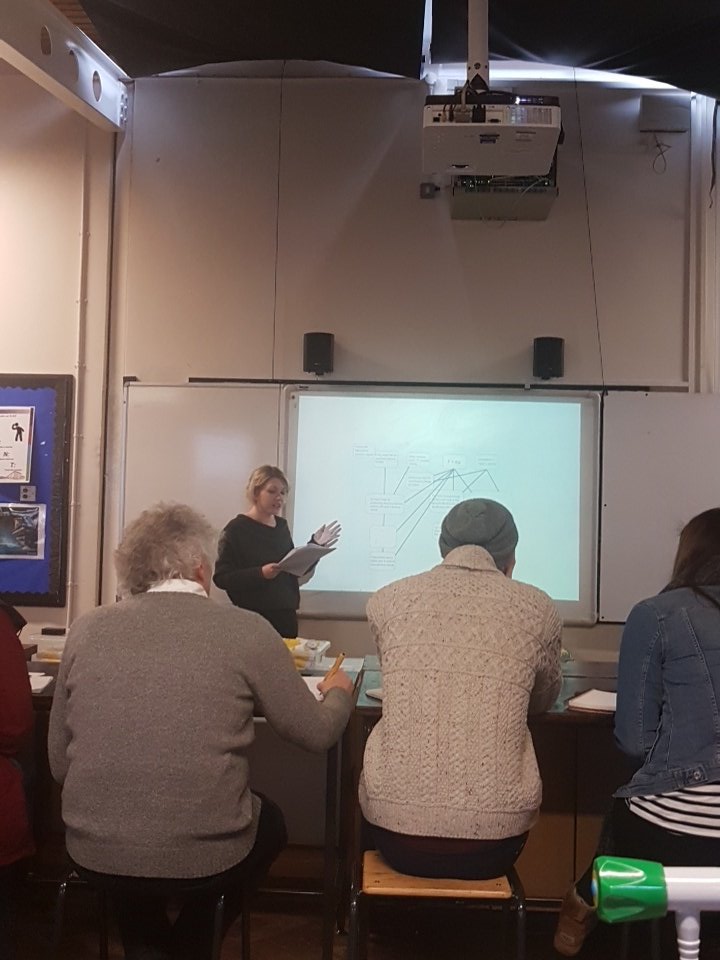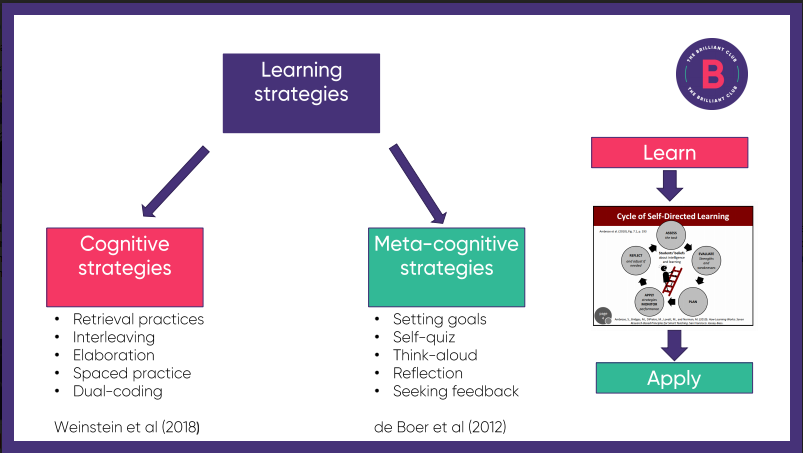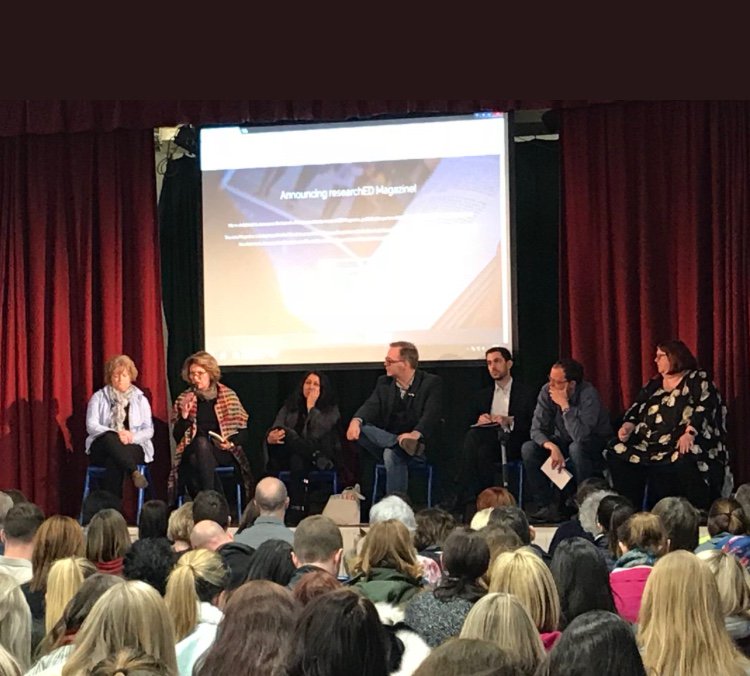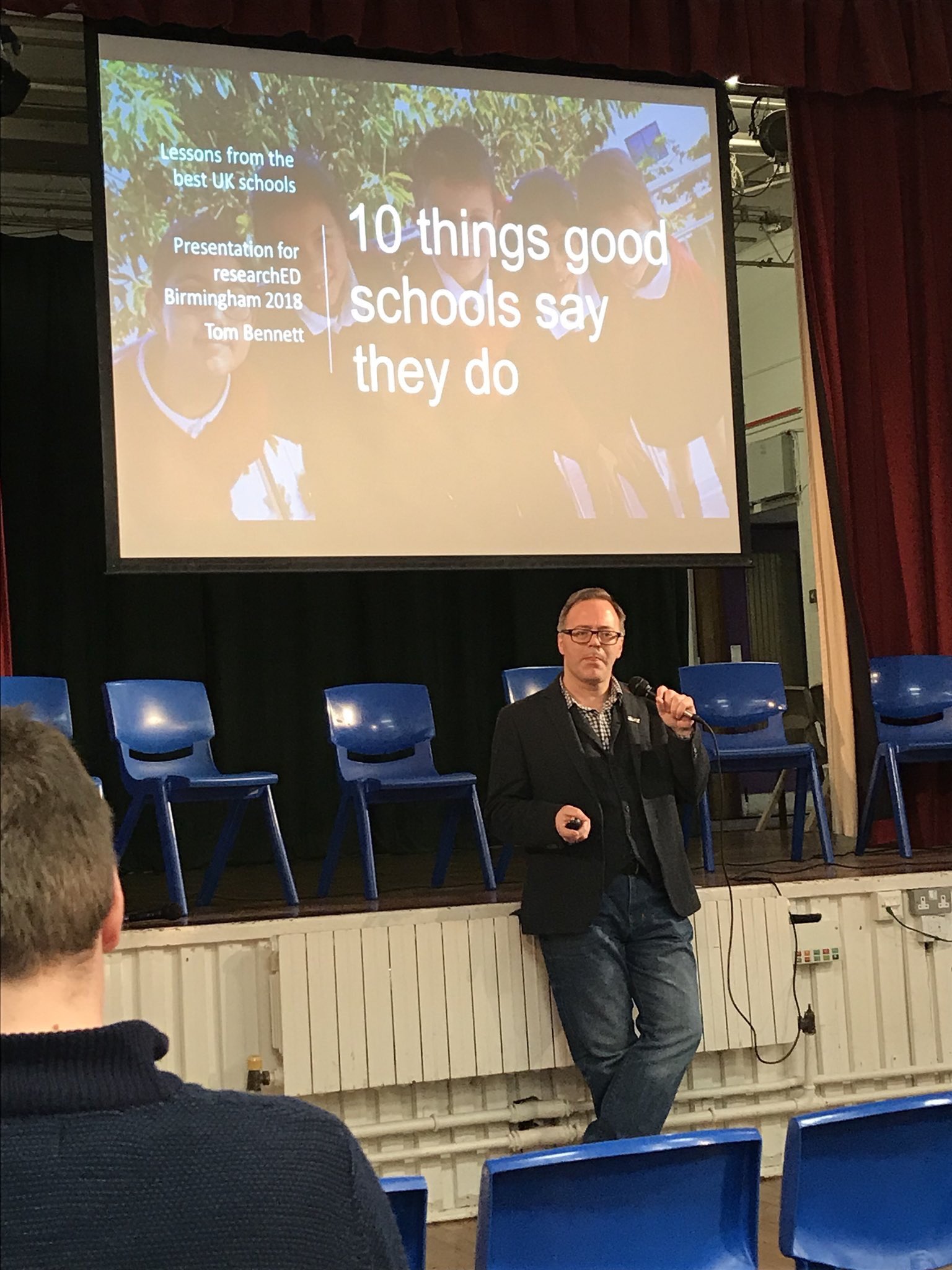Let me start with a confession: for the past few years, I’ve felt like something of a fraud. In spite of my open endorsement of teachers becoming better informed about educational research, I’d never attended a ResearchED event. Sandbagged with shame I decided enough was enough and made the pilgrimage up north to Birmingham for the city’s first ever ResearchED event.
For those who are unaware ResearchED is the nation, nay the world’s, preeminent educational research conference for teachers. The last detail is crucial – the events are fuelled by the generosity and curiosity of the teaching community, who host and put together the events as well as populating them with punters. And populate them they do; over 350 delegates from across the country were crammed into the Dame Elizabeth Cadbury school last Saturday – every single one of them passionate about synthesising academic research and classroom common sense to recast teaching as an evidence-led profession.
The day kicked off with an inaugural address from the head of Dame Elizabeth’s asserting, contra-convention, that the priority of a headteacher should be their staff, not their students. Staff who are properly fed and watered can then focus on doing what they do best – optimising the learning and wellbeing of their students. Well said.
Claire Stoneman, organiser of the conference, followed with an impassioned plea for the research movement to keep growing and building until critical mass when those in power can’t help but heed its message. Co-compering was Teacher Booker wingman, Tom Bennett, who galvanised ResearchED into existence four years ago. His palpable passion and excitement at how far the movement had come set the stage for an exciting and enlightening first session.
Session 1 – Rosalind Walker
I attended Rosalind Walker’s talk on “The Structure of School Science Knowledge and its implications for the classroom”. Dense with references to continental philosophers and pedagogical theorists, Rosalind characterises school scientific knowledge as a series of propositions (facts, theories, examples, methodological procedures, framing devices) that relate to each other in a non-linear map-like structure. Much of the knowledge that is relevant to school science is tacit and eludes verbalisation. However, framing knowledge in this structured manner can help us get a clearer sense of such knowledge.

Articulating scientific knowledge in this way isn’t just an idle bit of amusement for nerds – it provides a guide for the order in which students should be taught aspects of science, helps teachers triangulate typical misconceptions to remedy and get a clear sense of progress paths for individuals as well as whole classes. Walker’s passion about teaching physics, and teaching it well, permeated every aspect of her talk. I have little doubt that this passion also permeates her lessons and infects her students too.
One lingering question I had was the extent to which Walker’s framework could be extended beyond disciplinary boundaries – could there be structural maps that integrate items of knowledge from biology and chemistry perhaps? The issue struck me as pertinent as funding agencies for scientific research have recently started to favour inter and trans-disciplinary approaches, emphasising that junior scientists need appropriate training for these sorts of pursuits. It’s an exciting prospect to think that such training could begin in the classroom with knowledge maps that link otherwise discrete areas of the curriculum into a unified picture.
The Panel
After the first session, the full congregation was summoned back to the main hall for a wide-ranging panel discussion on the future of education. Cutting such a weighty topic down to size were Mary Myatt, Sam Twiselton, Clare Sealy, David Weston, Tarjinder Wilkinson and Andrew Old with Tom Bennett chairing.
After stating their personal visions for what education’s main problems and priorities should be, questions from the audience pulled discussion back and forth. There were questions about a knowledge-oriented curriculum, how to improve initial teacher training at scale and, peculiarly yet presciently, a question on how industrial automation should impact how and what schools teach.
This latter question didn’t receive the sort of engagement I suspect it is due, but that was mainly due to time constraints. While I don’t think the advent of mass automation means we need to the dramatic overhaul of education, given its overall structural impact on society it would be surprising if it didn’t affect education in some form or another and this should be the subject of discussion.
Session 2 – Philippa Cordingley
Rushed upstairs by some diligent prefects, I was just in time for Philippa Cordingley’s session on “Research and evidence based capacity-building in disadvantaged communities”. As CEO of the Centre for the Use of Research and Evidence in Education (CUREE) there could be few better people poised to describe how to encourage research-informed practice at the scale of a whole school or learning trust.
Philippa’s approach begins with helping teachers identify their relative level of comfort with research, along a gradient of novice up to ResearchED veteran. Each level of comfort has a corresponding hierarchical route towards how that teacher can improve their research literacy and implement it in the classroom. For example, a novice teacher is best introduced to a surprising novel research finding digested in bitesize form rather than having the Cambridge Journal of Education shoved in their direction.
This route to developing more research-informed practitioners has the emergent effect of developing a research-informed community, where teachers can discuss and feedback about findings in a non-judgemental spirit characteristic of scientific inquiry.
Although she had some suggestions, I remained curious about how to engage those who are not merely unfamiliar with educational research but, rather, are antagonistic toward it. It’s easy to forget at an event like ResearchED, but over the years the majority of teachers I’ve known have scoffed at the idea that some ivory-tower academic-type can teach them anything about how to do their job. There’s some truth there, but only a bit, and the net harm of such a belief is significant. I’d love to hear Philippa’s approach to disabusing teachers of this mistaken view.
Session 3 – Dr Celeste Cheung
Dr Celeste Cheung of the Brilliant Club led a session on “Using research evidence to inform the design and evaluation of in-school meta-cognitive strategies”. Firmly anchored in the cognitive psychology of ‘thinking about thinking’, Celeste encouraged teachers to reflect on how they implemented metacognitive practices in their classroom, how they could increase opportunities for them and a walkthrough of how metacognitive practices can lead to independent, empowered learners. Celeste also described the great work of the Brilliant Club, encouraging PHds to share their expertise with schools to help them refine their practice, as well as encouraging them to join the teaching profession and spread their knowledge and passion.

Evaluating the impact of a series of trialled strategies for encourage use of metacognitive strategies by students in school, Celeste detailed measures for assessing impact and areas for improvement and increasing overall effect size of the metacognition intervention. As such, it was a masterclass in the sort of scrupulous development and deployment of educational interventions that all attendees aspire to.
I was fortunate to catch Celeste after the day and discussed initial teacher training. Both of us were struck by the lack of formal instruction in research-literacy and psychology relevant to learning and socialisation as part of the typical ITT route. Indeed, with increased emphasis on schools-based routes with minimal uni time the issue seems to be exacerbating. I’d be keen to hear Celeste’s views as someone hovering between schools and universities on what features of her field she thinks are most important for teachers to learn about in ITT.
Session 4 – Mary Myatt
Mary Myatt exuded a warm but authoritative tone throughout her session “The curriculum con: Concepts, conversations and controversies” – to be expected from someone who has been working to improve schools for over 20 years. She favours a “High challenge, low threat” learning environment in which students are stimulated through engagement with profound concepts and non-trivial tasks whilst feeling supported, respected and not at risk of having their fate decided by an arbitrary assessment. Appealing equally to cognitive psychology and human decency, she argued persuasively for the further claim that oracy needs to be more of a focus in every aspect of the curriculum – “If you can’t say something properly, how are you going to write it properly?” she reasoned cogently.
Mary’s session was also studded with practical tips for bringing these lofty aims to life. Teachers can use the etymology of terms (e.g. ‘Incarnation’ in RE) to help students grasp their nuances as well as open their eyes to the connections between concepts (‘carne’ as relating to the flesh as in ‘carnivore’). Equally, why not start with the heavy stuff – why not start with a detailed breakdown of the political situation in Syria before examining a stock Geography topic like birth rates. It was notable that Mary was heavily informed by Dan Willingham who has emphasised the feed-forward mechanisms in knowledge that mean learning the complex stuff first is often necessary to understand the ostensibly simpler stuff.
Mary also said something during the panel that lingered in my mind throughout the day – for all the bluster about the need for a revolution in education, actually there are plenty of teachers and schools who know exactly what they’re doing and are doing it damn well. The aim of movements such as ResearchEd should be to identify and disseminate such practice in an accessible and discursive manner.
Session 4 – Tom Bennett
The final session for me was headline act Tom Bennett’s summary of his research as part of the DofE working party on behaviour management in schools: “Creating a culture: What we learned from some of the best schools“. Having visited over 200 schools, Tom distilled what he observed into 8 things all the best schools shared. Among them were principles of being incredibly clear about what was expected of students, practicing the subroutines underlying good behaviour until their were perfectly unconscious, clear and consistent whole-school systems and ensuring that strong routines are in place before opportunities for challenging behaviour can arise.
What was crucial in Tom’s talk was his emphasis on how, in spite of these uniformities, there was a huge variation in the schools that had strong behaviour. Some had uniforms, others didn’t; some had more punitive forms of reinforcement, others less so – the crucial thing was that these schools were clear, consistent and clairvoyant in their establishment of robust routines.
I’ve spoken at length to Tom about behaviour management previously and broadly we’re in total agreement. One question that remains for me is the extent to which his Anna Karenina principle holds – is there anything that some, if not all, schools with generally poor behaviour management have in common? I don’t doubt there’s a lot of overlapping issues here, but just wonder if a further family of common characteristics that could be drilled down to with some fine-grained analysis.
Conclusions
I was left with such a rich plethora of thoughts after ResearchED that it would be exhausting for all if I were to recite them here. Needless to say, however, that I felt giddy from the promises for a far-flung future state of a research-led practitioners and was thrilled to see that there are already so many out there.
The outstanding challenge for ResearchEd is how to broaden access. There are presumably lots of teachers who want to make sure their practice is effective and have some light interest in the research that would permit this, but aren’t the sorts of ardent acolytes who would make it cross-country for a Saturday conference. ResearchED’s upcoming journal seems to be a great move in the right direction but I’d be delighted to hear from others on how they think we can harness all this great momentum to spread the ResearchEd cause.



